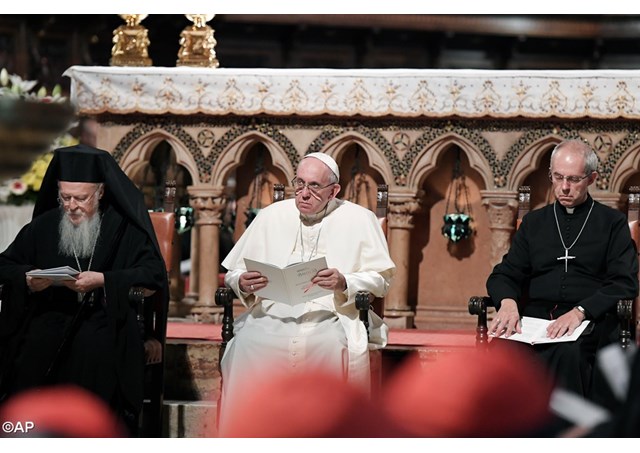
Christian unity plenary: what model of full communion?

(Vatican Radio) How is Pope Francis changing the Catholic Church’s relations with other Christians? How has the goal of the ecumenical movement altered over recent years? And what is the model of full communion as understood by the Catholic Church today? Those are just some of the questions being discussed at a plenary meeting of the Pontifical Council for the Promotion of Christian Unity taking place in Rome this week.
On Thursday participants met with Pope Francis who stressed that striving for Christian unity is an essential requirement of faith for all believers and a personal priority of his own. During the meeting members are also exploring the concept of unity as understood in the Orthodox and Protestant Churches, as well as in the newer ‘free Church’ communities.
Among those taking part in the discussions is Dominican Father Robert Christian, a former professor at Rome’s Angelicum university and currently responsible for the formation of Dominicans in the Western United States. He’s also a member of the Anglican-Roman Catholic International Commission and a consultor with the Pontifical Council.
He told Philippa Hitchen more about the focus of the November 8th to 11th encounter…
Fr Robert talks about the nature of Christian unity as summarized in five words beginning with the letter ‘c’: creed, code, cult, communion and charity, but he points out that not all those in dialogue with the Catholic Church share that same idea of unity….
At the heart of ecumenical discussions, he says, is the understanding of the Petrine ministry and he notes that many other Christians “feel a frustration at not being able to speak with one voice” about the Word of God.
Since Pope John Paul II published his encyclical on Christian unity, ‘Ut Unum Sint’, he notes how many partners in dialogue have been trying to re-evaluate how the Petrine ministry can serve the whole Church, while not renouncing the uniqueness of that role.
Speaking of the way the decisions of Pope Francis and his predecessors have affected the ecumenical dialogues, Fr Robert points to the changes taking place within the Synod of Bishops, established during the Second Vatican Council. Pope Francis, he says, is moving towards giving “deliberative power” to the Synod, and discussions at the plenary are examining “models of synodality which would include the participation of those who are not bishops”.
Discussions about ethical and moral issues, he says, are secondary to the question of how such decisions are made, as the Anglican-Roman Catholic International Commission is currently exploring.
Regarding the goal of the ecumenical movement, he warns against “thinking we have gone as far as we can go”. Rather than just tolerating diversity, he says “we want diversity to be an expression of richness in unity, so we’ll keep working for that.
| All the contents on this site are copyrighted ©. |


